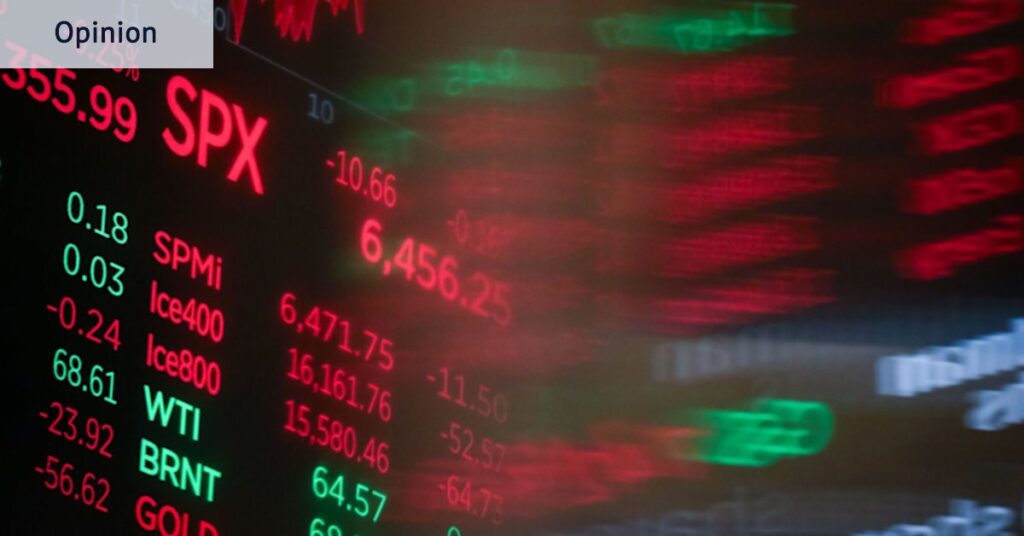
Concerns over the soaring stock prices of companies involved in the artificial intelligence (AI) boom have intensified, impacting share, bond, currency, and cryptocurrency markets. Over the past week, the U.S. stock market has fallen nearly 2%, bond yields have edged down, the U.S. dollar has reversed its year-long decline, and Bitcoin, which was above $124,000 less than a month ago, briefly dipped below $100,000 overnight.
These fluctuations are indicative of a risk-off environment, with investors moving away from assets perceived as risky and gravitating towards safer options like U.S. Treasuries. This shift in investor sentiment appears to have been triggered by the recent quarterly results from major technology companies.
AI Investment Surge Raises Concerns
Despite strong earnings growth reported by tech giants such as Amazon, Meta Platforms, Alphabet, and Microsoft, these companies also revealed significant increases in their capital expenditures for this year and next. Collectively, they plan to spend nearly $375 billion this year, primarily driven by investments in AI infrastructure and chips.
Amazon expects to invest $125 billion this year, up from the $118 billion previously forecasted. Google raised its capital expenditure expectations from $85 billion to as much as $93 billion. Meta plans to spend over $70 billion, with an even larger amount anticipated next year. Microsoft will invest $80 billion this year, with more spending expected next year.
These four companies, along with OpenAI and Nvidia, are at the core of the highly interconnected AI ecosystem and are expected to increase their aggregated spending by more than 20% next year. However, while Meta’s earnings were generally well-received, its share price has plunged since revealing its expenditure plans, dropping about 16.5% over the past week and wiping approximately $270 billion off its market capitalization.
Market Skepticism and Economic Implications
Unlike other major tech companies, Meta lacks a cloud business to offset some AI risks by selling capacity to others, raising concerns about the returns on these massive investments. The broader question remains whether these investments will generate returns that justify current valuations, despite the potentially transformative impact of AI.
The “Magnificent Seven” tech companies—Apple, Alphabet, Amazon, Meta, Microsoft, Nvidia, and Tesla—account for nearly 40% of the S&P 500’s total value. The market’s fate hinges on assessing AI revenues and profits against their substantial spending.
Furthermore, these investments are propping up the U.S. economy amid challenges such as Donald Trump’s tariffs, a shrinking manufacturing sector, rising unemployment, and a government shutdown. The interconnectedness of AI companies is creating a significant vulnerability for investors, the economy, and the U.S. financial system.
Expert Opinions and Market Predictions
Michael Burry, known for betting against the sub-prime mortgage market before the 2008 financial crisis, has reportedly taken $1.1 billion in short positions against Nvidia and Palantir. Burry has highlighted discussions of the circular and incestuous financing relationships within the AI sector, which has an unprecedented appetite for capital.
Goldman Sachs CEO David Solomon and Morgan Stanley’s Ted Pick have also suggested the possibility of a significant market correction over the next year or two. Solomon anticipates a 10 to 20% “drawdown” within 12 to 24 months, while Pick welcomes a potential 10 to 15% pullback not driven by a “macro cliff effect.”
Solomon and Pick refer to routine corrections during a lengthy bull market run, while Burry bets on something more structural and destructive.
Federal Reserve and Policy Uncertainty
Another factor influencing the market is the Federal Reserve’s recent policy decisions. The Fed cut its policy rate by 25 basis points last week but revealed unexpected divisions and uncertainty about the outlook for the rest of the year. Chairman Jerome Powell referred to “driving in the fog,” indicating uncertainty about unemployment and inflation amid a lack of economic data due to the government shutdown.
Investors who anticipated another rate cut in December, which would benefit the stock market and other risk assets, are now uncertain about the Fed’s future actions. Additionally, Trump’s tariffs, currently challenged in the U.S. Supreme Court, had provided some comfort regarding America’s growing debt and deficits.
The market’s focus remains on the sustainability of AI spending and its implications for the broader economy. As the situation evolves, investors and analysts will closely monitor developments in AI investments, market corrections, and policy decisions.







